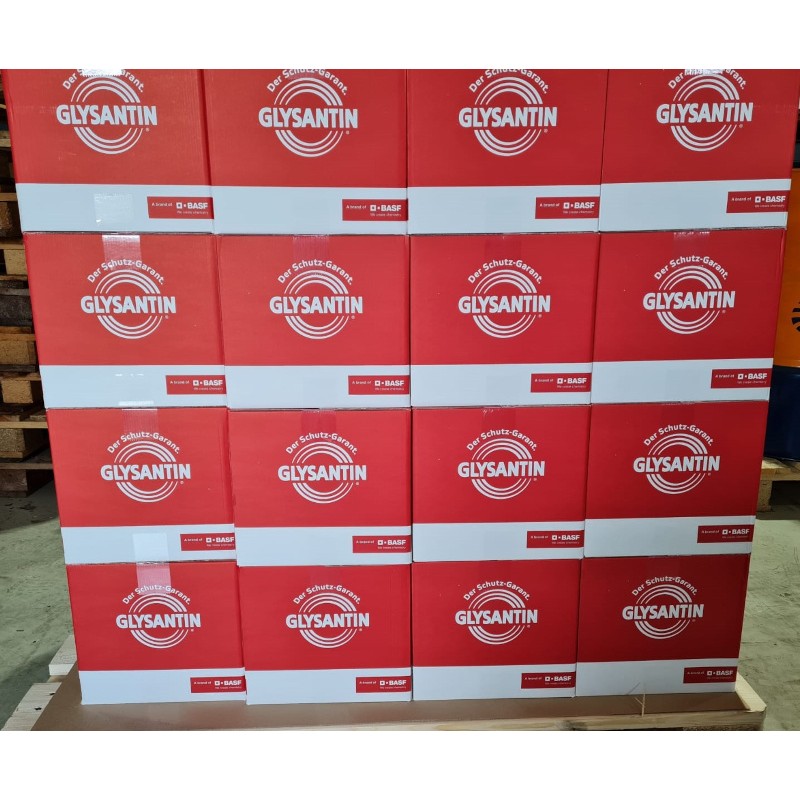- Online only








Glysantin® G48® blue-green provides excellent protection against corrosion, overheating and frost,
Glysantin G48 effectively reduces corrosion and deposits in the cooling system with its important components such as cooling passages in the cylinder head, engine block, radiator, water pump and heater core, Dilute coolant based on ethylene glycol with water before use
Glysantin G 48 Glysantin® G48® blue-green is a coolant based on ethylene glycol, which must be diluted with water before use. Glysantin G48 contains an inhibitor package based on silicate, borate and salts of organic acids (hybrid coolant). Glysantin G48 blue-green is nitrite-, amine- and phosphate-free.
Glysantin G48 blue-green fulfills the requirements of the following coolant standards:
AS 2108-2004, ASTM D 3306, ASTM D 4985, BS 6580: 2010, AFNOR
NF R 15-601, ÖNORM V 5123, CUNA NC 956-16, JIS K 2234: 2006,
SAE J1034, SAE J814, SANS 1251: 2005 and SH 0521-1999.
In addition, Glysantin G48 blue-green is officially approved by:
• BMW BMW N 600 69.0
• Reg. Arnsberg, 84.12.22.63-2001-2 Dept. Mining a. energy
• Bundeswehr TL 6850-0038 / 1
• Daimler / Mercedes-Benz specification 325.0
• Deutz H-LV 0161 0188
• Jenbacher TA-No. 1000-0201
• Liebherr Machines Bull TLV 035, TLV 23009 A
• MAN 324 type NF
• MTU MTL 5048
• Opel / General Motors B 040 0240
• Porsche for 924, 944, 968, 928
• Saab 6901599
• VW / Audi / Seat / Skoda TL 774-C
Miscibility: As Glysantin G48 blue-green does not have the particular advantages of using Glysantin G48 blue-green alone, mixing with other Glysantin coolants or products from other manufacturers is not recommended.ngine coolant concentrate based on ethylene glycol. It contains a hybrid corrosion inhibitor package with salts of organic acids and silicates. Glysantin G 48 is free of nitrites, amines and phosphates.
Glysantin G 48 meets the requirements of the following coolant standards:
ASTM D 3306, ASTM D 4985, SAE J1034, AFNOR NF R 15-601, ÖNORM V 5123 and BS 6580:1992.
Furthermore Glysantin G 48 is officially approved according to the following OEM standards:
• BMW BMW N 600 69.0
• Bez. Reg. Arnsberg, 84.12.22.63-2001-2 Abtl. Bergbau u. Energie
• German Army TL 6850-0038/1
• Daimler DBL 7700.20, page 325.0
• Deutz H-LV 0161 0188
• Jenbacher TA-Nr. 1000-0201
• Liebherr Machines Bulle TLV 035, TLV 23009 A
• MAN MAN 324-NF
• MTU MTL 5048
• Opel/General Motors B 040 0240
• Porsche for 924, 928, 944, 968
• Saab 6901599
• VW/Audi/Seat/Skoda TL 774-C
Glysantin G 48 can be mixed with other silicate containing engine coolants. Furthermore it can be mixed with Glysantin G 30 (silicatefree) if a silicate-containing engine coolant is not available. It should not be mixed with other silicate-free, OAT engine coolants. Glysantin G 48 must be diluted with water before use. It is hard water compatible and can be mixed with tap water* before filling into the cooling system to give solutions in the concentration range of 33 to 50 % by volume.
* For preparation of the coolant use clean, not overly hard water.
Waste water from mining, sea water, brackish water, brine and
industrial waste water are all unsuitable.
The analytical data of the water should not exceed the following limits:
Water hardness: 0 to 20 °dH (0 - 3.6 mmol/l)
Chloride content: max. 100 ppm
Sulphate content: max. 100 ppm
Should the analytical data of the water exceed the approved limits, then it has to be suitably treated, for example by mixing with pure, distilled or deionised water. Excessive chloride or sulphate levels can be corrected in this way.